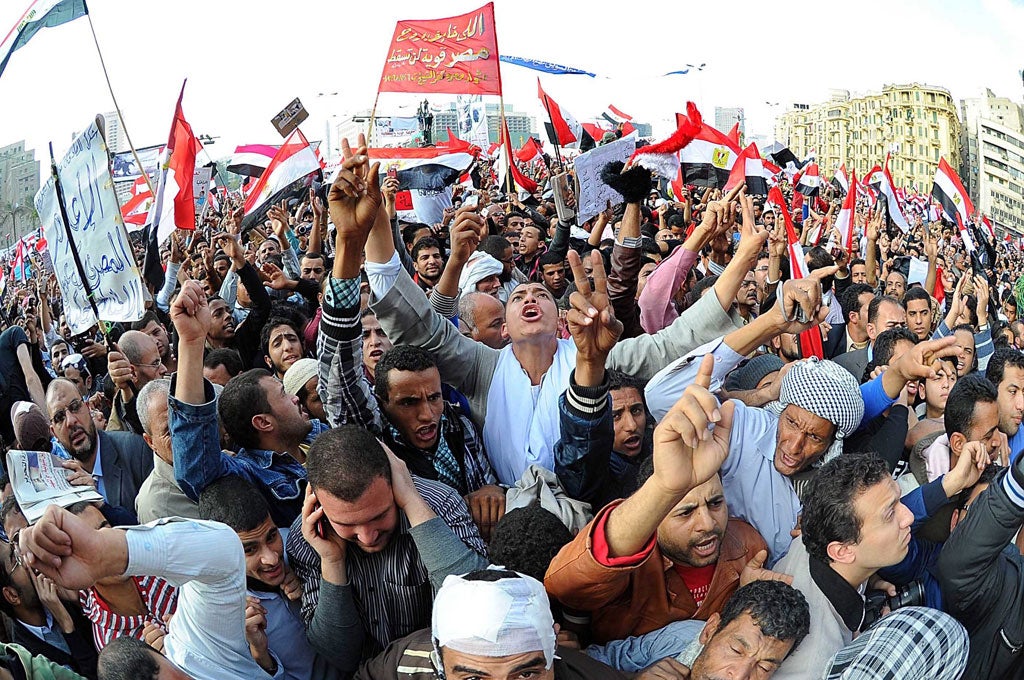Cairo: My City, Our Revolution, By Ahdaf Soueif

Your support helps us to tell the story
From reproductive rights to climate change to Big Tech, The Independent is on the ground when the story is developing. Whether it's investigating the financials of Elon Musk's pro-Trump PAC or producing our latest documentary, 'The A Word', which shines a light on the American women fighting for reproductive rights, we know how important it is to parse out the facts from the messaging.
At such a critical moment in US history, we need reporters on the ground. Your donation allows us to keep sending journalists to speak to both sides of the story.
The Independent is trusted by Americans across the entire political spectrum. And unlike many other quality news outlets, we choose not to lock Americans out of our reporting and analysis with paywalls. We believe quality journalism should be available to everyone, paid for by those who can afford it.
Your support makes all the difference.In January last year, when Tahrir Square erupted, a wild and foolish urge wanted me to race straight there, before sanity reminded me that "undesired Western influence" was written all over my pink khawaga face. So I followed it on the web, wondering, "Bliss was it, in that dawn to be alive?" And now the estimable Ahdaf Soueif has written an account of those first months of the Egyptian Revolution, and confirmed that yes, to be young was very heaven. This is above all the story of the shabab - the youth, the growing ones (Soueif gives a lovely gloss on the origins of the Arabic word) - who brought about the "18-day orgasm", as an Egyptian friend calls it, which kick-started the Revolution. We all remember the images: the laughter, the wedding, Muslims and Christians praying together, everyone cleaning up, and then later the cinema and the endlessly inventive protective headgear.
The title, My City, Our Revolution, reflects the book's dual personality. One moment we are in the Revolution, haring chronologically through a cloud of tear gas, handing out biscuits and waterbottles, furious at the cruelty of the baltagis - the criminals, released prisoners and so on hired as thugs by the regime - but remembering to keep it selmeyya – peaceful. Not one baltagi was killed by the demonstrators they so regularly attacked. The next we are in Soueif's heart and past: standing on a palm roof looking out over an orchard to the pyramids beyond, remembering her parents, her childhood, her own love affair with her city.
Bursts of lyricism, poetry and love illuminate the factual account and political commentary, and it works beautifully. Family is the link, in particular her indomitable sister Laila, whose campaigner son, Alaa abd el Fattah, was released from prison just after Christmas.
History as it happens is a slippery beast and Soueif greets it head on, reminding the reader from time to time that we will know more about what has happened than she does at the time of writing. The immediacy is palpable: Soueif finished writing in November 2011; now it is January. The rotten elections have been held, and the process continues. Demonstrators arrested by the army live under threat of military trial, though they are civilians. Saudi money floods into Egypt. Egyptian gas is still sold cheap to Israel when Egyptians can't afford to buy it. The previously un-Egyptian concept of the Martyr gains currency, with all its unforgiving, sentimental, distracting-from-the-matter-in-hand baggage.
And here's a story: a surgeon, having lost an eye to a sniper, then lost the other the same way. He is hailed as a hero. "I call him an idiot," says my friend. "Everyone knows they aim for the eyes. He should have used eye-protection. Didn't he know he was more use as a surgeon?" But then you have Sanaa, one of the team who set up al-Gurnal, the Tahrir newspaper: "I dreamed of the fall of Mubarak and of elections, any elections... I've just worked out I can't vote because I'm not 18 yet."
"The questions that are being settled on the streets of Egypt," Soueif writes, "are of concern to everyone... Can a people's revolution that is... democratic, grassroots, inclusive and peaceable succeed?" And she says: "This book is not a record of an event that's over. It's an attempt to welcome you into... an event we're still living."
Read this book. Pass it on to your own shabab. Perhaps point out the bit where she says "optimism is a duty".
Louisa Young's novel 'My Dear, I Wanted to Tell You' (Harper Press) was shortlisted for the Costa Novel Award
Join our commenting forum
Join thought-provoking conversations, follow other Independent readers and see their replies
Comments